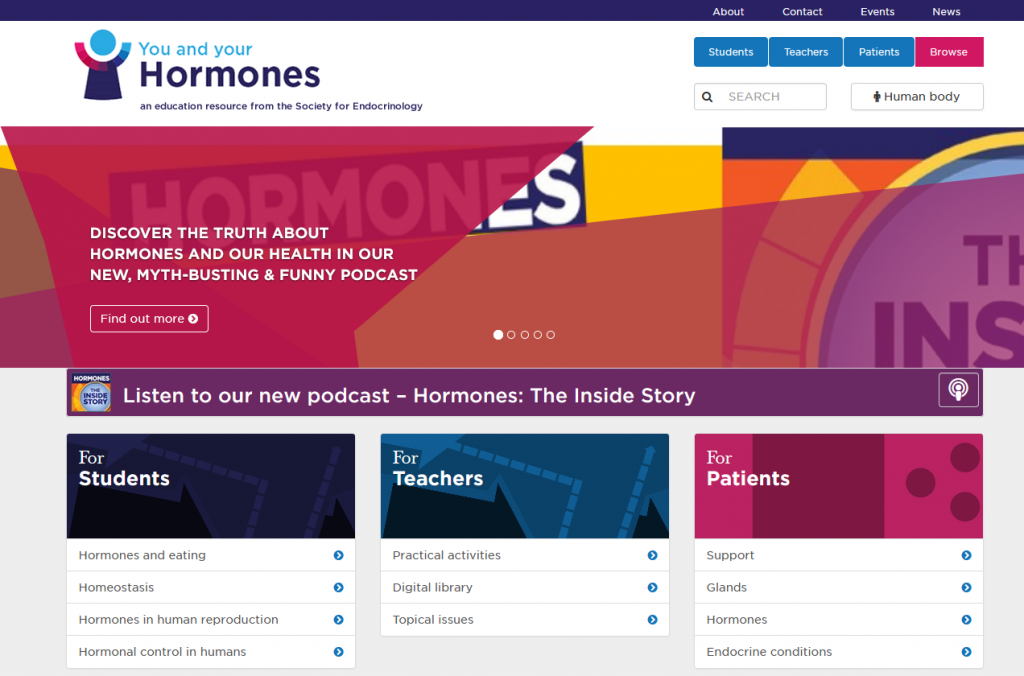Dr Ali Abbara and Dr Chioma Izzi-Engbeaya from Department of Metabolism, Digestion and Reproduction, Section of Investigative Medicine discuss their public engagement work with the Society for Endocrinology.
The Society for Endocrinology has a long-standing mission to inform the public about hormones and hormone-related conditions. In order to meet this aim, it has formed a ‘Public Engagement Committee’, of which, we are both members. The committee regularly organises outreach activities, including at schools and science communication events, to engage with the public and amplify knowledge about hormones.
In this age of ‘post-truth’ news, the Society for Endocrinology has made a significant investment to provide a reliable and accessible source of information for the public about hormones and the conditions that can transpire when they are not functioning normally.
A key flagship resource is the website ‘You and Your Hormones’ https://www.yourhormones.info. This website aims to provide patients, students, and the general public access to understandable, reliable, and fact-checked information on hormones and hormone-related medical conditions written by expert endocrinologists from the Society’s membership. Through the website we aim to raise patient and public understanding and awareness of hormones through podcasts, animated videos, information sheets and news items, with the content regularly updated to ensure comprehensive coverage of hormone-related topics.
The ‘You and Your Hormones’ website (above) is very popular and is one of the top results returned by Google searches for hormone-related terms, receiving 3 million hits in the last year.
As healthcare providers, we spend much of our careers learning a new second language of medical terminology, so that we can communicate with colleagues and engage with the scientific literature. We use it so frequently that there is an inherent danger that we may become desensitised to it, and on occasion can mistakenly use terminology that is unfamiliar during communication with patients or the public. Consequently, it is especially important to recognise instances where we might slip into using medical jargon and to take care to substitute for more accessible wording. Clear jargon-free communication is essential to ensure that discussions can take place in a domain where all parties are appropriately informed and therefore empowered to be active participants in any decision making. An important way to ensure this for content is for it to be reviewed by the public to confirm that suitable wording has been used.
What advice would you give other researchers interested in doing something like this?
The ability to communicate clearly is fundamental to engaging the public and raising awareness of endocrinology. Further, there is currently an unmet need from patients and the public to be able to access understandable and informative information about their health, science, and research. We encourage healthcare professionals and researchers from other medical fields to provide similar resources and involve the public in reviewing content to make sure that it is pitched appropriately. Working with relevant medical societies and royal colleges can be one way to achieve this. Ensuring that a source of information is available to people that is accessible and accurate is crucial to engaging and empowering patients and the public about their health.
So, what’s next?
We will continue to update and improve the content available on the ‘You and Your Hormones’ website to ensure that this resource remains informative and useful to patients and the public. The committee is planning to diversify content on the website and add new videos, articles, and podcasts on ‘hot’ hormone-related topics. We are also working towards expanding our reach amongst schools, linking subjects to the curriculum and creating exciting digital content that can be used in the classroom.

